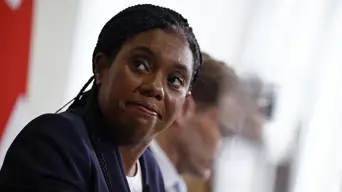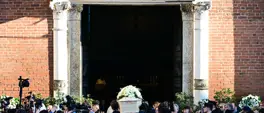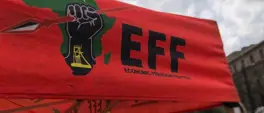MALAIKA MAHLATSI | Badenoch, the IDF and the use of women to legitimise genocidal violence and racism
Malaika Mahlatsi
1 August 2025 | 11:33"The apartheid state of Israel has always used women to both legitimise and glamourise its monopoly of violence in relation to Palestine."

Olukemi Olufunto Adegoke Badenoch, better known as Kemi Badenoch. Photo: AFP
In her devastatingly poignant poem about the killing of children in Gaza by the murderous Israeli army, Hadeel, Palestinian-Canadian poet, Rafeef Ziadah, profoundly states: “Israeli security is absolute, it’s written in blood and bulldozers and the art of women spokespersons – because death is softer coming from a woman, death is more polite coming from a woman”.
Ziadah, one of millions of displaced Palestinians who have been forced into exile by the apartheid state of Israel, is reflecting on a dangerous strategy that has been effectively used throughout history – the use of women to mask the pungent smell of violence and to give legitimacy to brutality.
The apartheid state of Israel has always used women to both legitimise and glamourise its monopoly of violence in relation to Palestine. In August 2016, VICE magazine ran a story titled “Photos from the Everyday Lives of Young Female Israeli Soldiers” written by Malan Toledano, an Israeli-born and New York–based artist.
VICE describes the series as Toledano “looking to redeem a small piece of her teenage girlhood during which she served as a soldier herself and was stripped of all cultural feminine symbols”, and attempts to position women serving in the Israeli Defence Force (IDF) as being unseen and misrepresented. A few weeks later, VICE published another article in the series, this one titled “The Defiant Femininity of Israel’s Female Soldiers”.
The publication described this particular article and accompanying photos as being illustrative of “female Israeli soldiers whose girlishness and teenage boredom act as a subtle but undeniable form of protest”.
At face-value, the articles and photos provide an intimate account of the everyday lives of women serving in the IDF - many of them young, and some of them, like Toledano, not being in support of conscription. But just beneath the surface lurks a dangerous narrative that has been cemented by the apartheid state of Israel – that of women in the IDF as strong, courageous and patriotic, rather than as killing machines trained by a fascist state to annihilate Palestinians and other Arabs across the Middle East.
As we speak, the IDF women soldiers, whose numbers have increased significantly over the years, have played an active role in the genocide that is currently unfolding in Palestine. More than 60 000 Palestinians have been killed in just under two years (not counting the thousands who have been killed since the apartheid state of Israel was established in 1948, and the millions who have been displaced since the Nakba) not only by bombs that have been raining down on a daily basis, but by starvation.
The apartheid state of Israel has used women spokespersons to communicate its crimes against Palestinians. These women, often polished and “feminine”, are deemed palatable by many in the western world because they represent liberal values in their aesthetic.
Israel as a nation is far more westernised and liberal than its Arab neighbours, and uses this to not only legitimise its occupation of neighbouring Arab countries, but to also demonstrate its allyship with the west by cementing its commitment to western values. In so doing, it has cemented itself as the leader of the free world in the Middle East, much like the United States has done. And like the apartheid state of Israel, the United States uses this self-proclaimed status to legitimise its own occupation of other countries, violent regime changes in sovereign lands, and systematic atrocities.
Although the apartheid state of Israel has perfected the art of using women to sanitise its genocidal violence against Palestinians, it is certainly not the only institution that understands the power of such a strategy. On the other side of the world, in the United Kingdom, the Conservative Party has tailored it to facilitate its own racist and xenophobic violence.
In November 2024, the party elected a Black woman to be the face and the voice of the growing anti-Black racism that is on the rise in Britain. Olukemi Olufunto Adegoke Badenoch, better known as Kemi Badenoch, is the Leader of the Opposition and the loudest voice in the hostile anti-immigrant sentiment that has swept across much of Europe.
Badenoch was born to Nigerian parents in Wimbledon, England, in 1980. Her mother had travelled to England for medical treatment when she gave birth to Badenoch just a year before the United Kingdom abolished birthright citizenship – a process whereby someone is granted citizenship on the basis of being born in a particular country.
Badenoch’s mother, a professor of physiology, returned to Nigeria shortly after giving birth. It was there, in the metropolitan city of Lagos, that Badenoch grew up before moving to the United States. She returned to the United Kingdom in her mid-teens, where she studied and would later work in the private sector before joining politics as a conservative.
Badenoch, despite her Nigerian roots, is extremely vocal in her hatred for Africans in general and Nigerians in particular. She once wrote in an article that the British “cannot be naïve and assume immigrants will automatically abandon ancestral ethnic hostilities at the border, or that all cultures are equally valid - they are not."
She has also been firm in her stance that under her leadership, Conservatives will introduce a new immigration policy which will include a strict cap on immigration and tight access to British passports. She is a proponent of “turn back the boats” politics - policies aimed at intercepting and returning migrant vessels, often involving asylum seekers, to their point of departure or origin, in complete disregard of international and humanitarian law.
Unsurprisingly, she holds largely favourable views about colonialism, arguing that it helped civilise Africans and denying the fact that Britain’s wealth was built on colonisation. And just as unsurprising is her staunch support of the apartheid state of Israel, which she has defended against accusations of genocide despite ample evidence of the fact.
Badenoch has never hidden her support for the apartheid state of Israel, stating that under her leadership, Britain would strengthen ties between the two countries. Badenoch being a Black woman, an African, gives legitimacy to her politics.
Anti-immigration, anti-Black, pro-colonialism and pro-apartheid politics sound “softer”, to use Ziadah’s term, when coming from a Black woman. It affirms racists, who are able to say: “Immigrants are uncivilised, dirty and diseased people. Blacks are savages.
It is not just us saying it - even Badenoch can see it!”. Her politics allow the genocidal Israeli regime to continue denying the apartheid it has instituted in Palestine, and to dismiss Africans who are likening it to our own experience of apartheid as illegitimate.
Women being used as spokespersons for violence and racism is insidious. We must never accept a narrative that presents IDF women soldiers as courageous without recognising that they are a killing machine whose courage extends only to murdering Palestinian women and children.
In the same breathe, we must not accept a narrative that presents women like Badenoch as an embodiment of progressiveness. There is nothing progressive about being a “better Black” in the eyes of racists, especially when being better depends on dehumanising and demeaning other Black people. This is not progressive – it is betrayal.
Malaika, an award-winning bestselling author, is a geographer and researcher at the Institute for Pan African Thought and Conversation. She is a PhD in Geography candidate at the University of Bayreuth in Germany.
Get the whole picture 💡
Take a look at the topic timeline for all related articles.
















